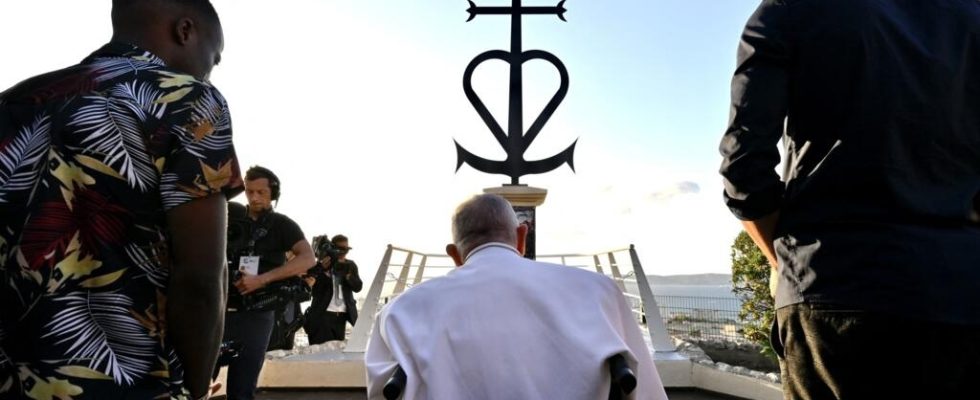Yesterday was the Pope’s first day in Marseille, on the shores of the Mediterranean. A sea that Francis renamed “the mare mortuum” (the dead sea) recalls Release. “At 4:45 p.m.,” says the newspaper’s special correspondent, the bells of Notre-Dame de la Garde, the Good Mother of the people of Marseille, begin to ring. Long and hard. Like a haunting death knell… It is a tribute to the tens of thousands of men, women and children whom the tragedies of the migratory crisis engulf in the sea and cause to die in the desert. The Pope spoke: “ We are gathered in memory of those who did not survive, who could not be saved. Let’s not get used to considering these shipwrecks as news items and deaths at sea as numbers: no, they are first and last names, they are faces and stories, they are shattered lives and shattered dreams. “.
Lampedusa
“ In this speech “, tell us The cross“ the pope rediscovered accents used at the very beginning of his pontificate. As if he had wanted to renew the appeal launched in Lampedusa in the summer of 2013. On the small island of Sicily, the newly elected pope castigated the world’s indifference towards migrants “.This time, “ the pope also denounced “the odious trafficking” and the “fanaticism of indifference”, against those who try to arrive in Europe “.
“ A speech that takes on a particular meaning in France “, REMARK the world“ as the island of Lampedusa faces an unprecedented influx of migrants. France where the Minister of the Interior, Gérald Darmanin, announced the refusal on the part of France to welcome migrants arriving from the other side of the Alps “.
The world also met Arthur, 22 years old. “ He experienced the horrors of migration as described by the Pope », says the newspaper. “ Arriving from Cameroon at the age of 17, he passed through Libya, crossed the Mediterranean to reach Italy, before crossing the border and going by train and on foot to Paris, where he first lived on the street “. His meeting with a nun was decisive. “ Christians need to get involved too “, estimates Arthur, “ it can change things “.
Concern in Nagorno-Karabakh.
“ Nagorno-Karabakh at the end of its slow agony “, title Le Figaro. “ At the mercy of Azerbaijan, residents of the Armenian enclave hesitate to surrender as fear of genocide returns “. Le Figaro recalls the events of recent days… On Wednesday, the separatist government capitulated, after 24 hours of bombing and fighting which left 200 dead and 400 injured. “. The representative of the Nagorno-Karabakh authorities in Yerevan testifies: “ the situation in Stepanakert is horrible… Azerbaijani troops are everywhere. People fear that Azerbaijani soldiers will enter the city at any time and start massacres “. Added to this is the feeling of general indifference. “ The world watches us die », says Viktor, 32, indignantly. “ The world helped Kosovo, but we could die”.
The Gauls without Asterix
Because the one who is regularly presented as the best rugby player in the world, was seriously injured during France’s match against Namibia on Thursday evening. The Parisian summarizes the situation: “ the captain of the XV of France, victim of a fractured cheekbone, is not sure of being able to play again during the Rugby World Cup “. But hope remains, hence this question on the front page of Parisian : See you in the final? The newspaper hopes so, because it says, “the Blues without Dupont are the Gauls without Asterix”.
